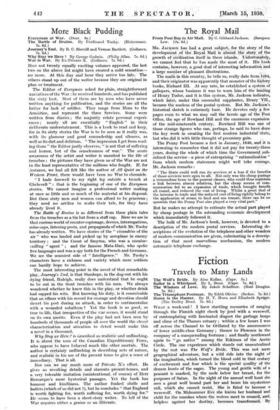The Royal Mail
Ma. JACKSON has had a great subject,. for the story of the development of the Royal Mail is rani:oaf the story of the growth of civilization itself in these islands. Unfortunately, we cannot feel that he has made the most of it. His.book contains,_ however, a good deal of interesting information and a large number of pleasant illustrations.
The milli in this country, he tells us, really date from 1484, and their originator was apparently that monster of the history books, Richard III. At any rate, he established a system of gallopers, whose business it was to warn him of the landing of Henry Tudor, and it is this system, Mr. Jackson indicates, which later, under this successful supplanter, Henry became ihe nucleus of the postal system. But Mr. Jacliiim's historical sketch is extremely bare. He devotes only a few pages even to what we may call the heroic age of the Post Office, the age of Rowland Hill and the enormous expansion of the mid-nineteenth century. Rowland Hill was one of those strange figures who can, perhaps, be said to have done
the key work in creating the first modern industrial-state, _ but who Aid it with little thought of pecuniary gain.
The Penny Post became a fact in January, 1840, and it is interesting to remember that it did not pay for twenty-three years, during the whole of which time the Government ,ub- sidized the service—a piece of enterprising " rationalization " from which modern statesmen might well take courage. Mr. Jackson remarks :
" The State could well run its services at a loss if the benefits
of those services were to all.' Not only was the cheap postage a tremendous-boon to the poorest classes, who could-thus-maintain a link between absent relatives, but the cheap means of com- munication led to an expansion of trade, which brought benefit all round, and reduced the cost of living. Whilst a great deal of the increase in trade and the reduced cost of living rightly belong to the application of steam to land and sea transit, there can be no question that the Penny Post also played a very vital part."
But he makes no attempt to estimate the actual part played by cheap postage in the astounding economic development which immediately followed it.
The bulk of Mr. Jackson's book, however, is devoted to a description of the modem postal services. Interesting de- scriptions of the evolution of the telephone and other wonders
of modem communication are given, culminating in a descrip- tion of that most marvellous mechanism, the modern automatic telephone exchange.




















































 Previous page
Previous page